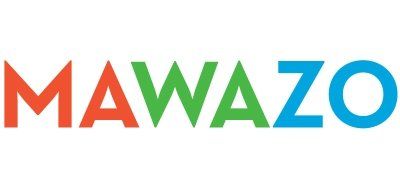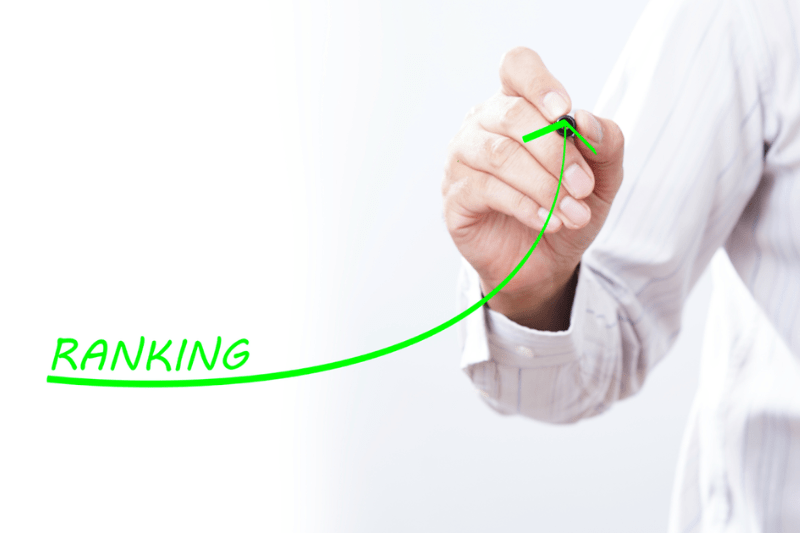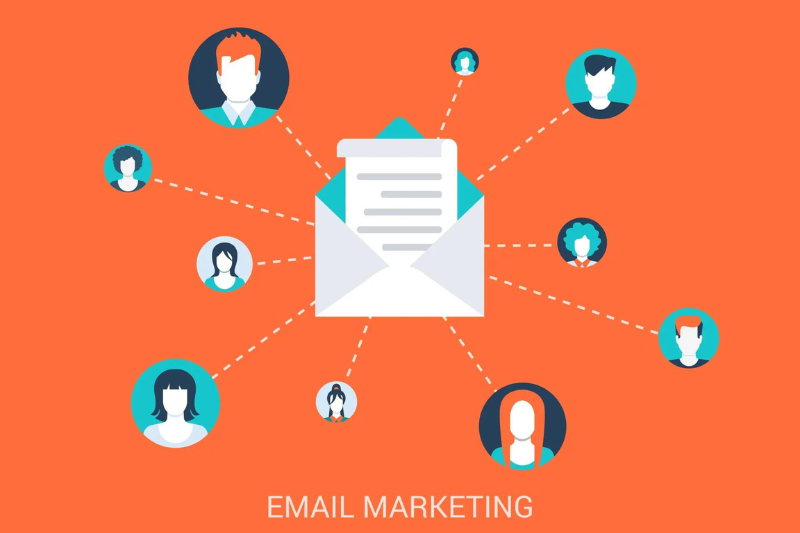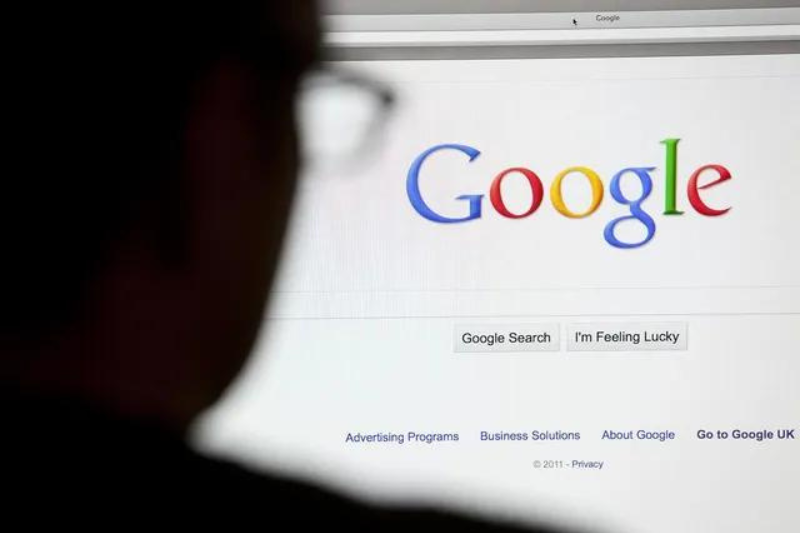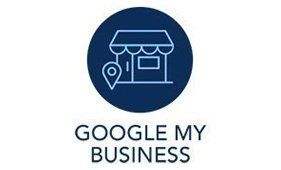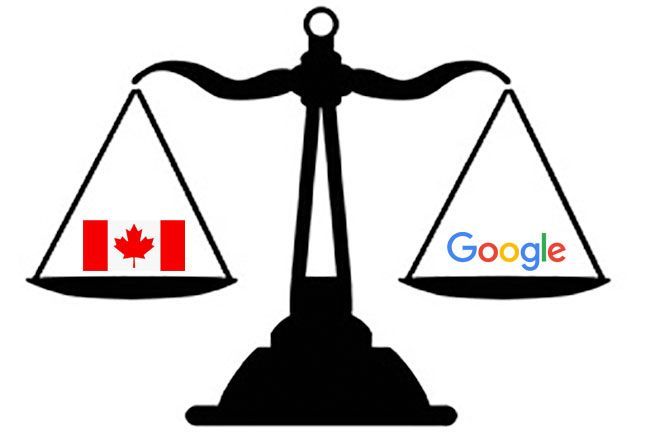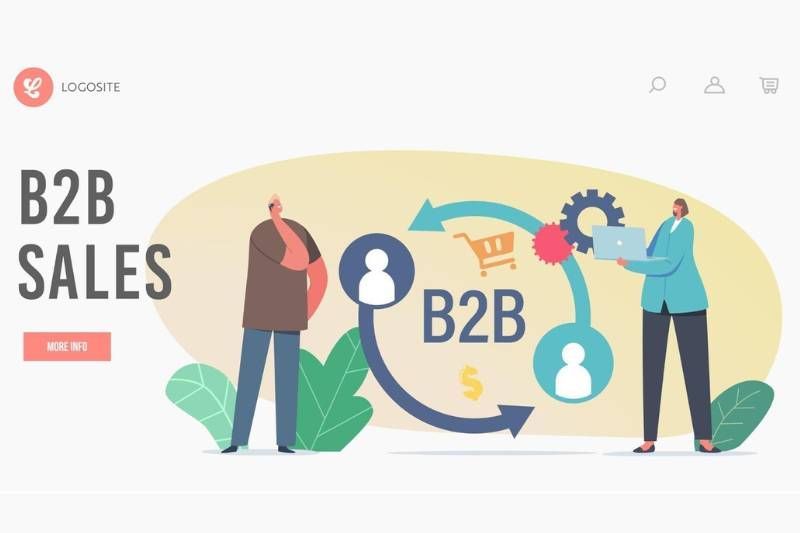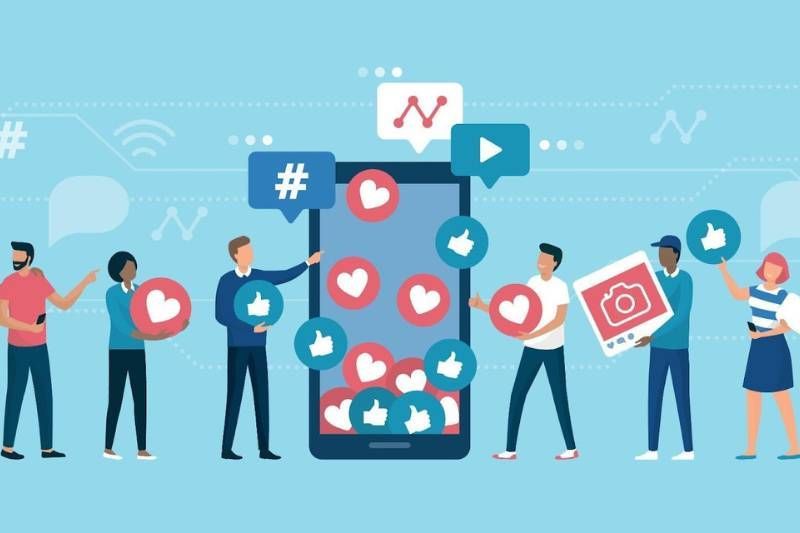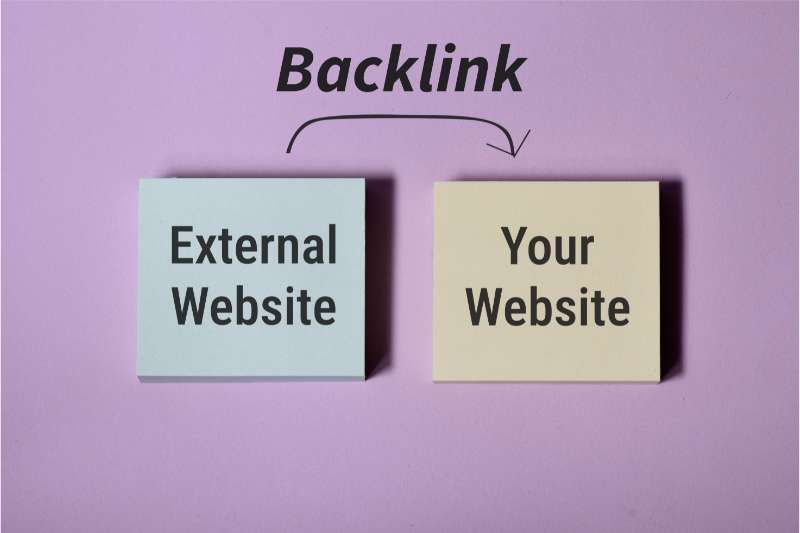SEO vs PPC: what is better for your business?
Search Engine Marketing is all about getting traffic from your presence in the search engines, in particular Google. Search engine optimization (SEO) and paid search advertising (PPC or pay-per-click) are the main ways to get website traffic from search engines. Both work well to get leads to your company website, but which one should you choose?
Let's first look at the results of a search on Google:
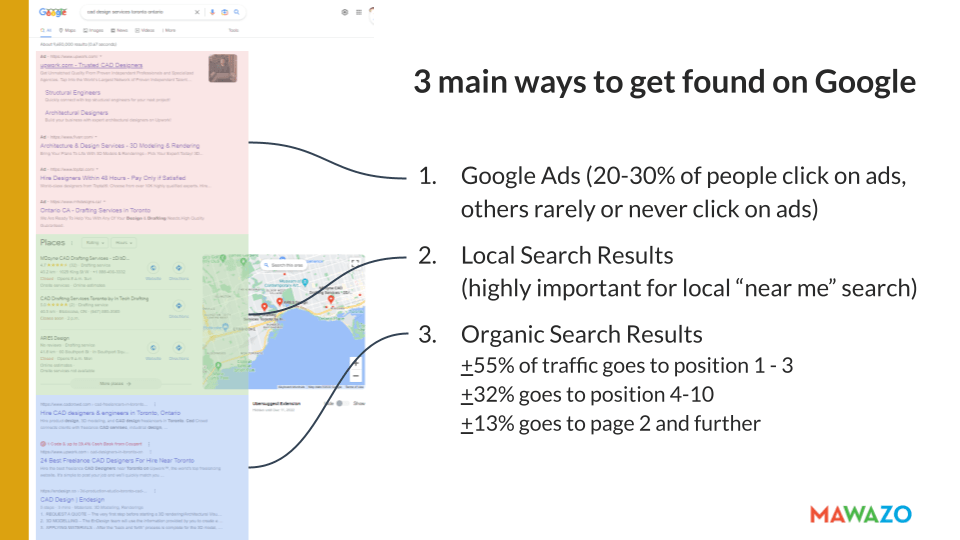
On a desktop, Google shows up to 4 ads on the top of the search results page. In the image that is the area in red. Typically 20% to 30% of web users may click on a Google Ad, while 70% to 80% of users ignore the ads and rarely or never click on a Google Ads.
See HigherVisibility:
Organic vs. Paid Search: (66 Astonishing) Statistics for 2022
If your search has a local relevance, then Google will show a map with 3 local search results. This is the yellow area on the image. It will have search results that are relevant to your location, and is very important for "near me" searches. Optimizing your website for these local search results is called local SEO.
Then the organic search results are shown in the green area. Every page on Google has 10 of these organic search results. Here are the click-through-rates (CTR) for the entries on the first page of Google:
- About 28% of the people will click on the number 1 on the organic ranking!
- Position 2 and 3 get about 27% of the SEO traffic
- About 32% of the traffic will go to the search results on position 4 - 10.
- The remaining 13% goes to the search results on page 2 and further.
So 55% of the traffic is generated from the positions 1, 2 and 3 on the organic listing! That's why being on the top of the google search results is considered to be the “holy grail” in search engine marketing!
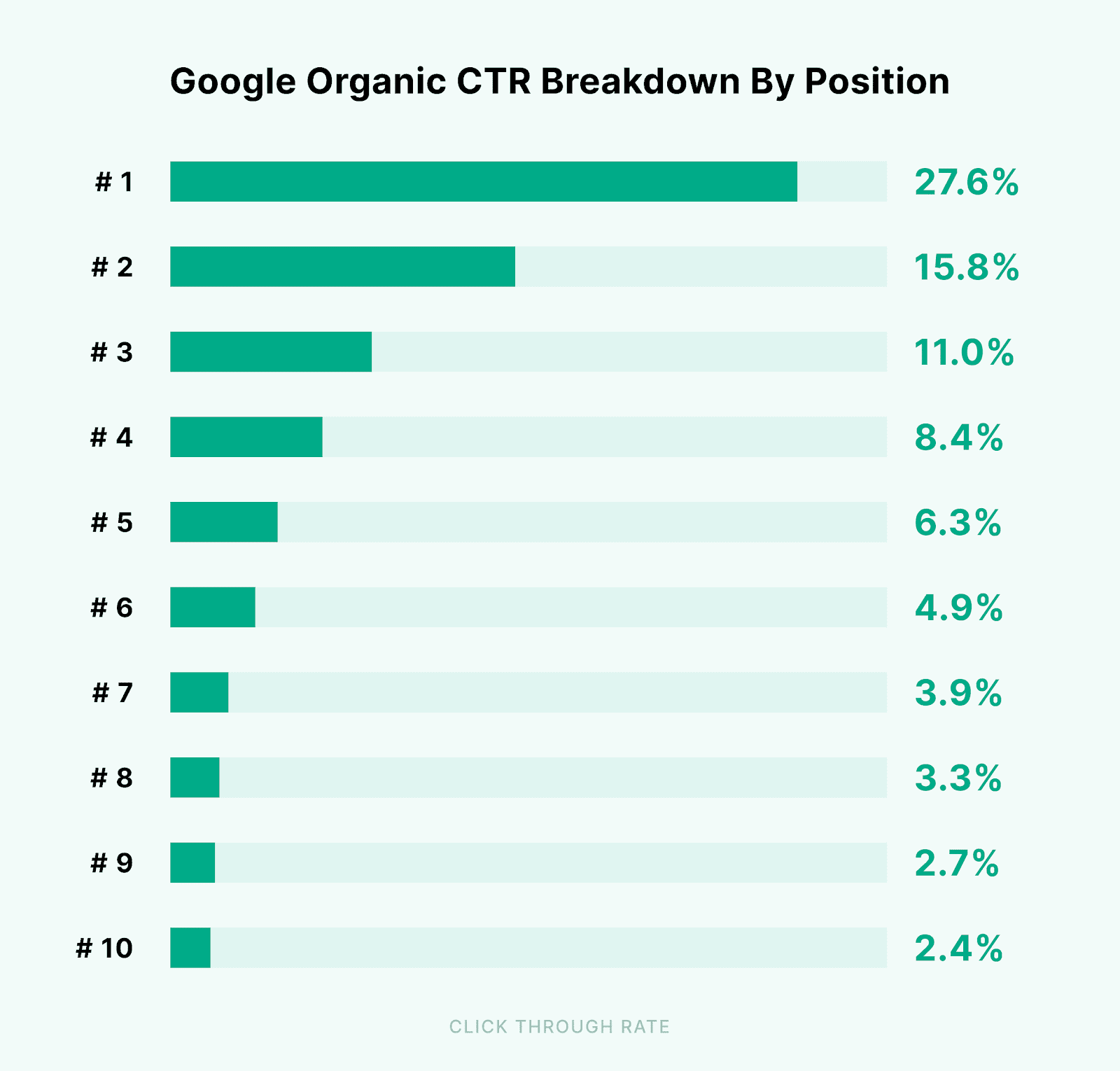
See Backlinko: Here's what we learned about organic click through rate
Let's look at the pros and cons of SEO and PPC.
What is Search Engine Optimization?
SEO is the process of making sure your website shows up in the search results for relevant keywords. The goal is to make a web page rank on page 1 for a specific search term, and generate organic traffic to the website
SEO agencies often make SEO sound complicated and are secretive about their SEO services. However, in its essence it really isn't very complicated. You just need to keep in mind that Google wants to provide the best possible information to users when they search. As the owner of a website you can achieve that by creating authoritative content, getting other websites to link to your website, and by making sure your site meets the technical requirements of search engines.
So essentially SEO is about 3 things:
- Your website
This means making sure you have a well-structured website that is fast, safe and mobile-friendly. This is referred to as technical SEO. - The stuff on your website
This means making sure you have good content on your website, enriched with images, videos etc. This is called content marketing. - Links from other websites to your website
Links from other websites to your website are called backlinks. They are like "votes" from other websites. Backlinks are one of Google's main ranking factors.
See SearchEngineLand: Google's Top Three Search Ranking Factors.
Advantages of SEO
The benefits of SEO are numerous. In fact, according to a recent survey conducted by SearchEngineLand, over half of marketers surveyed believe that organic SEO is among the most important strategies for driving revenue growth. While there are many advantages to SEO, here are three reasons why it's likely to become one of your most important marketing investments
SEO is profitable
According to a report published by Forrester Consulting, "Search Marketing Optimization Leads To Higher Customer Lifetime Value." This means that every dollar spent on organic SEO leads to higher profits.
SEO provides long-term returns
When you invest in organic SEO, it doesn't always pay off immediately. In fact, for most websites it will take months before you start ranking well for search terms that are relevant to your business. But once your content starts ranking well and your website gains authority, the SEO efforts provide long-lasting results.
With SEO you can target different phases in the customer journey
Your potential customers will engage with you at different stages in the customer journey. SEO allows you to target customers in each phase in the customer journey with specific content.
For example, some customers are just getting to know your company, others may be ready to make a purchase, and existing customers might have purchased your product and are now trying to figure out how to use it. By focusing on these different customers, you can create tailored content that addresses their needs at specific points in the customer journey.
Drawbacks of SEO
SEO takes time
More than 80% of organic traffic is generated from page 1 of Google. However, for any search term you will find hundreds of thousands of search results! Getting to page 1 of Google simply takes time. According to SEMrush, it takes between 6 to 12 months to start getting SEO results.
See SEMrush: How long does SEO take?
The Google Algorithms change
Google makes thousands of updates to its search algorithm each year! These algorithms rank webpages based on relevancy. Whenever the algorithms change, the resulting ranking for a particular search term may also change.
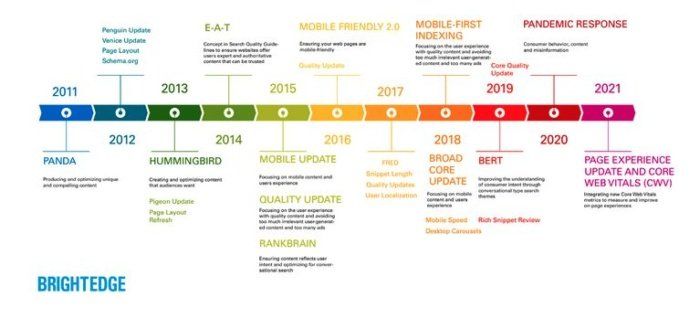
See BrightEdge: A Timeline of Google Algorithm Updates
SEO requires high-quality content
Google will likely produce hundreds of thousands of results for any given search term. The only way to stand out is to create unique, good quality content that answers the needs of your audience. But writing good content takes time!
Let's move on to PPC.
What is PPC advertising?
PPC advertising means placing advertising on search engines to improve the visibility of your website. Costs are usually incurred each time an ad gets clicked (cost-per-click or CPC) or by the number of impressions (cost-per-million or CPM). Search engines like Bing, Yahoo! and Google offer different ways to advertise, and social media like LinkedIn and Facebook also offer advertising platforms. In this article we will limit ourselves to Google Ads, since they compete directly with the organic search results on the Google search engine results page, and Google holds more than 90% of the market share.
See Statista: Worldwide market share of search engines
Advantages of PPC
PPC gives instant results
Google Ads allows businesses to quickly test different keywords, landing pages, ads, and bids to find what works best for them. In addition to being able to easily manage campaigns, it provides near-instantaneous results. You don't have to wait weeks or months to see results. With Google Ads, you can start seeing immediate results within minutes. This makes it easy to determine whether a keyword phrase is worth pursuing. If it doesn't perform well, you can change your bid price and try again.
PPC allows you to target your ideal client
With PPC marketing, you can pinpoint your ideal customer. You can find out what keywords are being used to find products or services like yours, where those customers live, how old they are, whether they're married or single, and much more. All of this information helps you narrow down exactly who you want to reach with your ads.
Paid Ads are above organic results of the search engine results pages
Paid advertising appears on the prime real estate at the top of search engine results pages (SERPs). It will always be the very first item a visitor will see. It takes up to the first four positions on desktop and three on mobile phones.
There are 10 organic results on each Google page, but sometimes the ads dominate the search engine results so much that you have to scroll down the page to start seeing the organic search results.
PPC provides straightforward data
PPC ad campaigns provide you with real-time metrics. This includes everything from impressions and clicks to conversions and cost per acquisition. All of this information helps you optimize your campaigns quickly and effectively.
Google is also more open with its paid advertising information than with its organic search results. So when you create a Google Adwords account, you'll have a clear insight on the effectiveness of each search term and landing page.
Drawbacks of PPC
It's a big financial investment
The average CPC across all different industries is between US$1 and US$2. However, the cost can go up to about US$50 for competitive industries for example in insurance, mortgages and law. Mind you, this is just to generate PPC traffic to your website, it doesn't mean that you have gained a new customer!
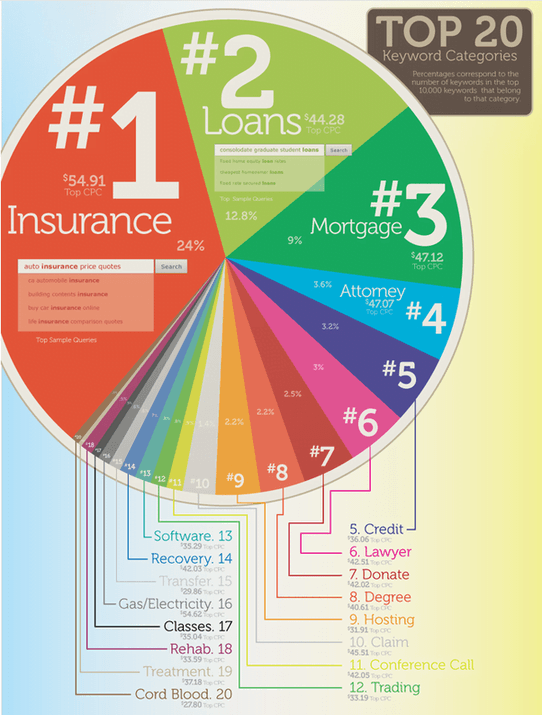
See Wordstream: How much does adwords cost
PPC ads stop working if you stop advertising
Any dollar spent in January only has an impact on that month, and not on subsequent months. So Google advertising only produces results if you keep on making advertising budget available.
What is better for my business: SEO or PPC?
The debate over whether SEO or PPC is better for your business has been going on for a long time. There are pros and cons to each strategy. What is best for your business depends on many factors, such as the type of business you run, the competition in your industry, the available financial budget and in-house resources, and the objective you want to achieve.
Let's compare SEO vs PPC for different objectives:
Objective: return on investment
Winner in the short term: PPC
Winner in the long term: SEO
Paid Ads typically will use a substantially larger budget than SEO. Advertising campaigns can be quite expensive to run, and they are only getting more expensive. On the other hand, when you start an advertising campaign, then you get results very quickly, and you can improve them over time. So there is an immediate ROI to paid ads campaigns.
With SEO the situation is completely different. Just ask your self how often you have clicked on a search results on page 3 or 4 of Google! About 83% of traffic goes to the entries on page 1 of Google, and about 50% goes to positions 1, 2 and 3! It can take a long time before a web page is ranking on page 1 of Google, and therefore it generally takes a long time before there is any ROI from SEO. However, once a web page is shown on page 1 of Google, then it will likely generate substantial conversion rates!
Also, efforts on SEO will continue to benefit your business, whereas any advertising budget will only work for the period in which it is used, and the moment you stop paying for Google Ads, the leads stop coming immediately.
According to Quicksprout.com, here is what you can expect from an SEO and PPC strategy: SEO doesn’t produce great results in the first months, but they will pick up after about six months and the ROI will continue even after the campaign ends.
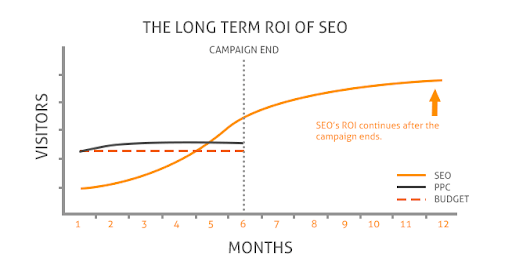
See Quicksprout.com: SEO vs. PPC: Which Should You Focus on First?
Objective: grow leads to your website fast
Winner: PPC
If you want to generate immediate sales, then Google Ads will deliver results. This is particularly true when you are trying to reach people with "purchase intent". If you want to reach people who are ready to buy at that very moment, then PPC is the way to go. When someone types one of your targeted search terms into Google, then they've already expressed an interest in your product or service. It makes them an ideal target for your advertising campaign.
Objective: brand awareness and exposure
Winner: SEO
There is a reason why 80% of web users ignore paid ads. They have more trust in the websites that are listed on page 1 of Google because they have achieved that position based on merit. A paid ad on page 1 of Google, on the other hand, is bought. As a result, users tend to trust paid search ads less. So if you want to build brand awareness, trust and authority, then it's best to stick with SEO.
Objective: targeting your ideal client
Winner: PPC
Knowing your ideal client and effectively targeting them is the basis of every digital marketing strategy. With paid ads, you have a lot of options to target your ad to a specific target audience. On the other hand, with SEO the possibilities are limited to targeting specific search terms.
Objective: having a predictable outcome from your marketing
Winner: PPC
Ultimately the Google search engine algorithms define how a website ranks for a particular search term, so it's difficult if not impossible to predict the results of an SEO campaign. With Google Ads, however, it is much easier to control the budget and fine-tune the campaign.
SEO or PPC? or SEO and PPC?
SEO and PPC can both be very effective online marketing tactics, and depending on the situation you may want to turn to one or the other. However, if you're really serious about the competitive position of your business, then you'll probably want to use them both.
See Search Engine Journal: How to Combine SEO & PPC Data for More Powerful Results
Here are some of the ways in which SEO and PPC, used together, will produce much better results than when you use just one of them.
Use PPC for keyword research
With Google Ads you can get feedback on the effectiveness of selected search terms very quickly. This information is very useful to select the target keywords for SEO. Essentially you would use the search terms with the highest click-through-rates in your Google Ads account, and use them on your web pages to optimize your website.
Get more conversions with remarketing
With SEO you can get more leads to find their way to your website. Then you can use Google Ads to create a audience from your website visitors and target them with a remarketing campaign. That way you can keep your business top-of-mind after a visitor has found your website through an organic search.
Use PPC to generate traffic while you build up your SEO
One of the main advantages of a PPC campaign is that the results are so much quicker to generate. You can set up your campaign and you will appear on the top of the search engine results pages almost instantly. So while you put in place a long-term SEO strategy you can use Google Ads to drive traffic to your website.
Use SEO and PPC at different stages of the customer journey
Paid search is great when someone has a clear intent to buy a product or service, while SEO is much better at creating trust and authority for potential buyers who are researching. Take advantage of this buy using SEO and PPC at different stages in the the customer journey.
A well-optimized website makes PPC cheaper and more effective
The factors that Google uses to determine the ranking of a web page for a particular search term are essentially the same factors that define the "Quality Score" in Google Ads, and the quality score is very important in determining how much you will pay for a click. So when you optimize your web page for search engine ranking you are actually reducing the cost-per-click of Google Ads!
Conclusion on SEO vs PPC: it's best to use both SEO and Paid Search!
So, which is better: Search Engine Optimization (SEO) or Pay Per Click (PPC)? They're both great digital marketing tactics, and they're both essential parts of your overall digital marketing strategy. However, there are times when one might be better suited for certain types of campaigns.
There are many reasons why SEO and PPC work together very well. They complement each other and can work hand in hand to achieve your desired outcomes.
So the bottom line is that businesses would do best to leverage both SEO and PPC in their digital marketing strategy.
Do you have any questions on the above, or would you like to share your experience? Just email ideas@mawazo.ca or call +1 (833) 503-0807.
At Mawazo Marketing we work with owners of B2B companies who want to accelerate their business. We help them with a concrete digital growth plan, a website that saves operational cost, and a digital marketing system that generates leads. For qualifying clients we offer a 5x ROI guarantee: if we don't reach the objective, then we pay back the difference. Book a Free Strategy Session to find out more.


